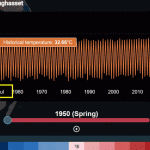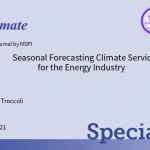Act on climate change through education
Positive outcome on SECLI-FIRM webinar coinciding with UNESCO World Conference on Education
Education is crucial in promoting climate action. It helps the public understand the climate crisis impacts, empowering them with knowledge and encouraging positive behaviour change to reduce carbon footprints and adapt to the global climate crisis.
WEMC aims to create a bridge between meteorology, climate science and young people, by raising awareness on climate change. To facilitate climate education and engagement, we developed Teal – a free, easy-to-use climate data visualisation tool. Teal enables users to explore changes in climate variables and carbon emissions over 70 years, from 1950 to near-real-time. It offers unique opportunities for students, educators, climate activists and the public at large to explore historical changes both where they live and across the globe.
Working together, our team of weather and climate experts play a critical role in disseminating this message, as was seen recently in the SECLI-FIRM Climate Education Webinar. WEMC are part of the EU H2020 SECLI-FIRM Climate Services project consortium. The webinar coincided with UNESCO’s World Conference on Education for Sustainable Development and attracted participants from across the world. The online event included an introduction from Alberto Troccoli, WEMC Director. He mentioned the growth in youth action, asking we act on climate change and highlighting the role climate data can play in supporting debate around climate change.
This was followed by a keynote presentation from Christian Zulberti, Head of Relations with Universities and Research Centres at ENEL Foundation, who are working with WEMC to customise the Teal historical climate data tool with new indicators on wealth distribution, climate change risk and energy transitions.
Luke Sanger, WEMC’s Head of Data and Information Services, then demonstrated how Teal can be used as a free resource by educators, students and the public at large to explore changes in climate over time. The future development of Teal will include further data e.g. emission per capita and/or emission intensity (emission/GDP).
A panel discussion was next moderated by Asher Minns, Executive Director at the Tyndall Centre for Climate Change Research. The panel included: Cristina Rekakavas, Specialist, Green Development and Climate Change from UNITAR, Sylvia Knight, Head of Education at RMetS and Derrick Mugisha, Regional Director for Africa at Earthday.Org. The experts shared their experiences and thoughts on climate education. They agreed that historical climate data is key to understanding the impacts and building knowledge on climate change.
Why is climate change education important?
Climate education, it was agreed is key for enabling future climate action, as also demonstrated in recent initiatives (Earthday, Berlin Declaration UNESCO).
Webinar participants raised the issue of ecophobia for young people, who often hear about climate change in the media, causing them to feel fear and apprehension. The expert panel responded to this exchange, suggesting a switch from ‘anxiety to agency’. RMetS encouraged the use of positive stories and peer to peer learning to tackle ecophobia – ‘so (the young people) can see themselves in the solutions.’ Suggesting this could be further bolstered with existing opportunities to incorporate climate science education in non-science curriculums in schools, thus providing students a broader picture of the factors contributing to and solutions to the climate crisis. Campaigning for and assessing government investment and commitment to inclusion of climate change within existing curriculums is a key area for EarthDay.Org. Additional governmental investment in climate change education to become a standard part of the school curriculum globally would be vital to reaching set targets too.
Our panellists shared that educating the next generation about the extreme climate events is essential. It will help them to understand how their behaviour impacts the climate and help them devise new approaches to address the issue. Working together is how we begin to act for a better future.
View the recording ‘Climate Education: Understanding the past to empower climate action’ Webinar from 27 May 2021
Explore Teal for free:
Discover more about Teal and why historical climate data matters for making future decisions:
wemcouncil.org/wp/explore-why-historical-climate-data-matters-for-making-future-decisions/




